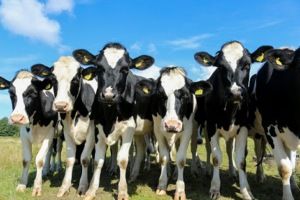News
‘Greener’ cows could be in the pipeline
This article is more than 7 years old.
A major sources of methane – one of the troublesome greenhouse gases – is cattle

The new breed of cows produce less methane … and they will eat less food (photo: pxhere)
New prize-winning Danish research points to how the amount of methane gas produced by cows is genetically-determined.
This could pave the way for engineering a reduction in ’emissions’ through the genetic modification of a bull’s semen.
READ ALSO: New grass to reduce cow-burping methane emissions
A project involving Aarhus University, the Technical University of Denmark (DTU) and Viking Genetics has shown positive results, reports DR Nyheder. Last Friday, it was awarded Innovationsfonden’s ‘Grand Solution’ prize for 2018 in recognition of its perceived value for the future.
Gassing down
At present, Danish milk production accounts for around 6 percent of the total greenhouse gas emissions in the country. If ‘greener’ cows were to result from Danish semen, the amount of methane could be reduced by around 5 percent – or the equivalent of 90,000 tonnes less CO2 per year.
“Five percent maybe doesn’t sound much, but as the years go by, the effect will increase. Eventually, it will really make a difference,” said senior researcher Peter Løvendahl from Aarhus University.
As well as producing less methane, it is envisaged that future cows would also need less food, so the project will result in cost savings for farmers.
Good for exports
Bull semen is also a major export item for Denmark and could be of interest to countries in Asia, South America and Africa.
READ ALSO: Danish bull sperm making splash in Thailand
“We could lower methane emissions [in those countries] by 15-20 percent more than here, as we already have low methane emission rates per cow in Denmark,” adds Jan Lassen, the project head at Viking Genetics.
The only fly in the ointment for Danish farmers is that it is expected to take up to five years before cows bred from the modified semen are widely available.






































